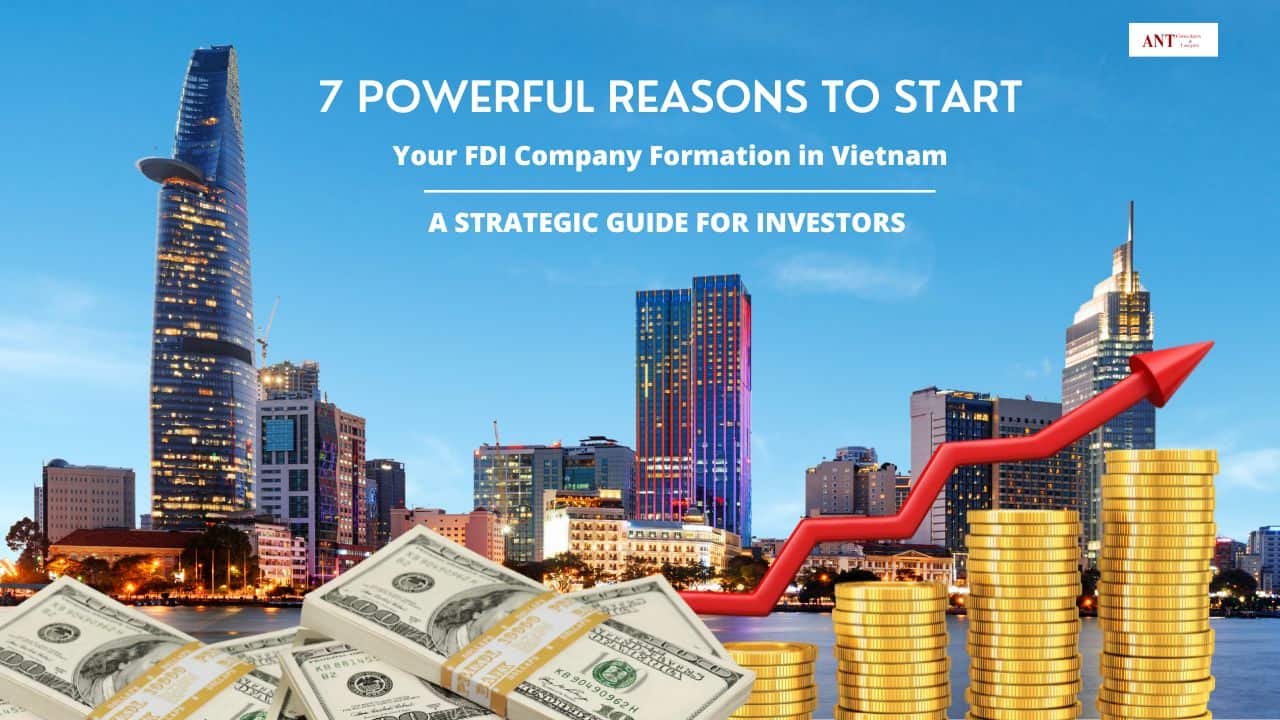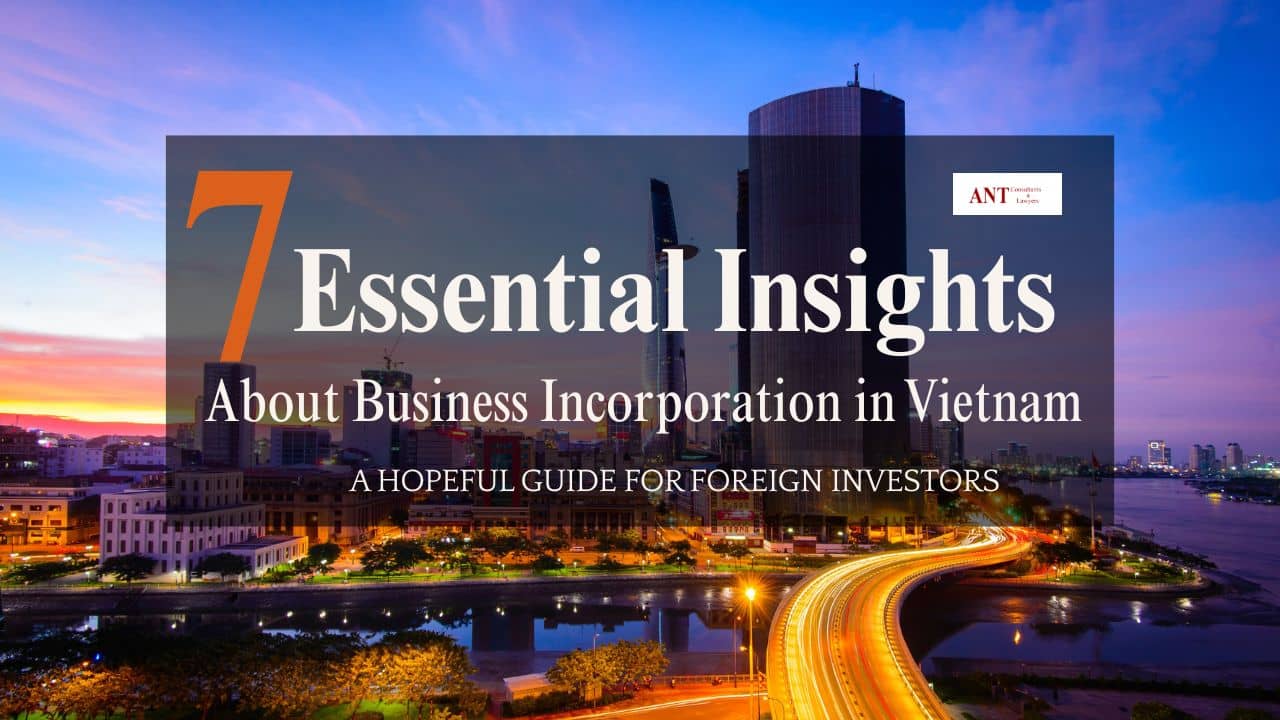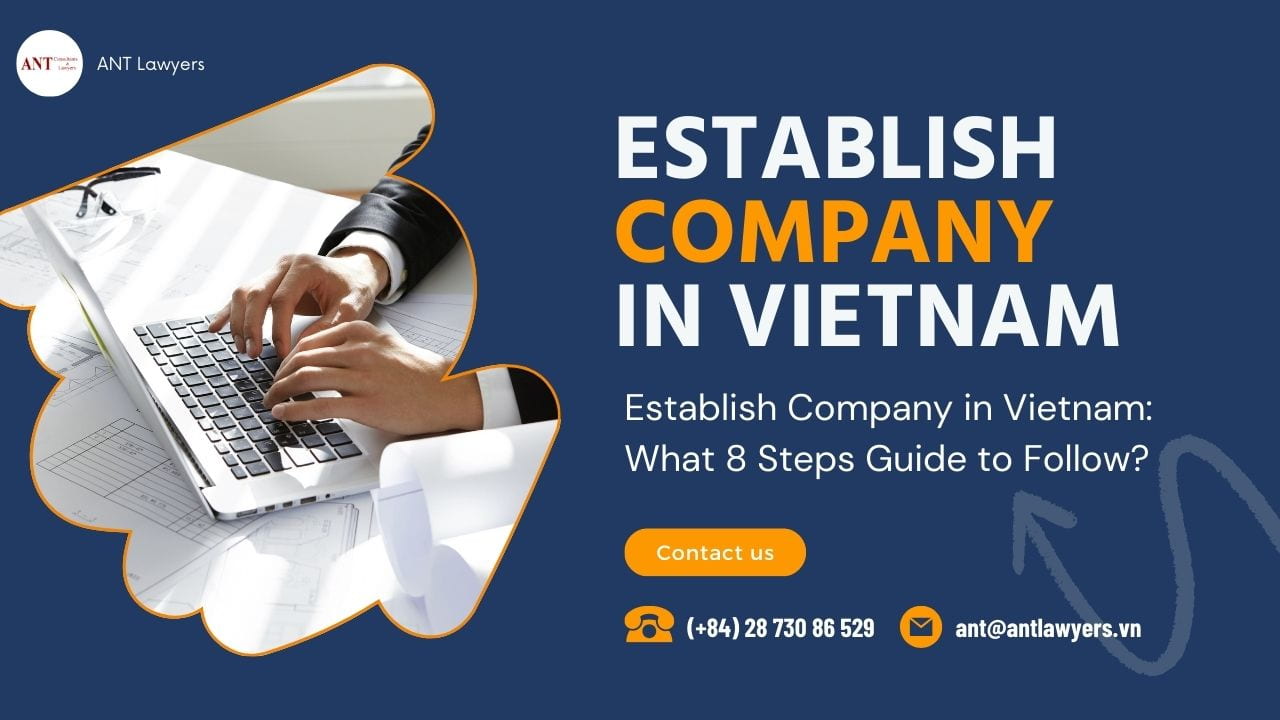7 Powerful Reasons to Start FDI Company Formation in Vietnam Now: A Strategic Guide for Investors


FDI Company Formation in Vietnam
Momentum.
That’s Vietnam. Rising. Steady. Ready.
Amid global turbulence, trade wars, supply chain shifts, digital disruption, Vietnam stands calm. And strong.
Investors are taking notice. At the core of this movement is one decisive act: FDI company formation in Vietnam.
It’s not just about incorporation. It’s about adaptation.
But here’s the challenge: FDI company formation in Vietnam is forming a company in a foreign country, even one as welcoming as Vietnam, comes with complexity. Legal processes. Licensing requirements. Tax regimes. Compliance risks. These can overwhelm even experienced investors.
Still, the potential? Enormous.
In here, you will discuss insight into legal structures, tax incentives, licensing strategy, and market trends in FDI company formation in Vietnam.
Why Now? The Global and Vietnam Context
The world is changing fast. Borders aren’t just geographical anymore, they’re economic, regulatory, and digital. As global companies diversify away from traditional hubs, Vietnam is emerging as a preferred destination for stability and opportunity.
FDI company formation in Vietnam has become a top strategic move.
First, the geopolitical tensions between major economies have triggered a wave of realignment. Companies are no longer comfortable putting all their eggs in one basket.
Second, Vietnam isn’t just passively receiving investment. The country is actively shaping its FDI environment. A number free trade agreements, including the EVFTA, RCEP, and CPTPP gives foreign investors unprecedented access to global markets with favorable tax regimes.
Third, the Vietnamese government has leaned in with policy reforms that make FDI company formation in Vietnam simpler, faster, and more secure. The digital transformation roadmap, green energy focus, and the national push for high-value manufacturing are just a few reasons why investors are optimistic.
Legal Structures for FDI Companies
Choosing the right legal structure is the first and most critical decision for any FDI company formation in Vietnam.
The two most common structures for FDI company formation in Vietnam are:
- 100% foreign-owned enterprise (FIE): This model provides full ownership, maximum control, and direct access to profits. It’s ideal for investors who want autonomy and are entering non-restricted sectors.
- Joint ventures: Here, a foreign company partners with a Vietnamese entity. This is often a legal requirement in sectors with foreign ownership caps, or it can be a strategic choice for leveraging local knowledge and networks.
Each model has its pros and cons. Full ownership allows for strategic alignment and brand control. Joint ventures, while offering local insight and risk-sharing, require careful negotiation and alignment of interests.
The choice also impacts licensing requirements, tax liabilities, and exit flexibility. That’s why understanding your sector and long-term goals is essential before initiating FDI company formation in Vietnam.
Key Legal Frameworks
Vietnam’s legal landscape for FDI is governed by several cornerstone regulations:
- Law on Investment: It defines permitted business sectors, conditional investment areas, and guarantees for foreign investors.
- Law on Enterprises: This law governs corporate structure, shareholder rights, and business operations.
- International Trade Agreements: Vietnam’s membership in the WTO and major FTAs provides protective mechanisms and dispute resolution options.
A crucial element in FDI company formation in Vietnam is the “negative list”, which outlines sectors where foreign investment is restricted or conditional. These include areas like national defense, rare minerals, and certain types of media.
Investors should also pay attention to sector-specific regulations issued by line ministries (e.g., health, education, finance) that may add layers of compliance.
Legal clarity is improving, but interpretation and enforcement can vary locally. Therefore, legal advisory from local experts remains essential.
Registration Process
Forming an FDI company in Vietnam involves two core procedures:
- Step 1: Investment Registration Certificate (IRC): This confirms the government’s approval for the foreign investment project. It requires details such as project scope, capital structure, investor background, and financial capacity.
- Step 2: Enterprise Registration Certificate (ERC): Once the IRC is approved, the ERC is issued to recognize the legal status of the company as a business entity in Vietnam.
After these certificates are obtained, investors must:
- Open a capital bank account in Vietnam and inject charter capital within the registered deadline
- Register tax and electronic invoicing systems
- Comply with labor registration in Vietnam and social insurance regulations
The process typically takes 20–45 business days, depending on the sector and locality. However, working with an experienced consultancy or law firm can streamline FDI company formation in Vietnam, especially in conditional business lines.
Location Considerations
Where you set up your company can significantly influence your cost, compliance load, and operational effectiveness.
Vietnam offers a range of location choices based on investor goals:
- Urban centers for access to talent, infrastructure, and government services
- Rural or inland areas for lower costs and potential tax incentives
- Coastal regions for logistics advantages and export-driven manufacturing
Investors should assess:
- Labor availability and wage levels
- Connectivity to ports, airports, and supply chains
- Provincial investment policies (some regions offer better incentives)
Importantly, the location impacts your eligibility for certain tax holidays and incentives, making it a vital strategic choice during FDI company formation in Vietnam.
Taxation and Incentives
Vietnam offers a relatively attractive tax regime for FDI companies, with multiple incentives available based on location, industry, and scale of investment.
- Corporate Income Tax (CIT): Standard rate is 20%, but preferential rates (10% or 15%) are available for high-tech, R&D, and social-impact sectors.
- Tax Holidays: In many cases, companies are granted full CIT exemptions for up to 4 years, followed by 50% reductions for several years after.
- Import and Export Duty Exemptions: Applicable to equipment, raw materials, or projects meeting localization thresholds.
- Personal Income Tax Incentives: Foreign professionals may enjoy certain exemptions or reductions depending on their residency and the employer’s tax classification.
Understanding these incentives and structuring your business accordingly is a smart move when planning FDI company formation in Vietnam.
Operational Compliance
Once operational, your FDI company must comply with a range of Vietnamese laws and administrative obligations.
Key compliance areas include:
- Labor Laws: Contracts, social insurance, and trade union regulations
- Work Permits: Foreign managers and specialists require valid work permits in Vietnam or work permit exemptions
- Accounting and Audit: Vietnamese Accounting Standards (VAS) are mandatory; audits are required for most FDI enterprises
- Licensing Renewals and Reporting: Annual reports, statistical filings, and industry-specific permits may be needed
Failure to comply can lead to fines, suspension, or revocation of licenses. Ensuring consistent compliance after FDI company formation in Vietnam is as important as getting the registration right.
Sector-Specific Licensing and Regulation
While Vietnam is open to many sectors, several industries require additional layers of approval:
- Education: Must comply with regulations from the Ministry of Education and Training
- Healthcare: Requires stringent licensing from health authorities
- E-commerce and Fintech: Regulated by the Ministry of Industry and Trade and the State Bank of Vietnam
- Logistics: Involves customs licensing, transport permits, and possibly bonded warehouse approvals
In these cases, general registration (IRC and ERC) is just the start. Sector-specific licenses are necessary to begin lawful operations, adding complexity to FDI company formation in Vietnam.
Common Challenges and Risk Factors
FDI companies in Vietnam face several practical and regulatory challenges:
- Administrative procedures: While improving, the administrative environment can still be slow and inconsistent across provinces
- Land Use Rights: Complexities in leasing industrial land or converting use purpose for real estate projects
- Partner Disputes: In joint ventures, poorly drafted contracts can lead to deadlocks or litigation
- Currency Controls: Restrictions on outbound transfers, including repatriation of profits and capital
Risk mitigation starts with early legal due diligence and choosing the right partners, licenses, and advisors from day one of your FDI company formation in Vietnam.
Exit and Restructuring Strategies
A sound investment also plans for the future, including the exit.
Foreign investors in Vietnam may exit through:
- Share Transfers or M&A: Selling part or all of the enterprise to another foreign or local investor
- Liquidation: Voluntary closure requires settlement of all debts, taxes, and employee rights
- Conversion: Transitioning a company from FIE to joint venture (or vice versa)
Repatriation of capital, profits, and gains is allowed but requires proper tax clearance and regulatory approvals. Planning your exit strategy is part of smart FDI company formation in Vietnam.
Legal Certainty as a Strategic Advantage in Vietnam
In international business, legal predictability is everything. It builds confidence. It minimizes risk. It ensures operations scale sustainably.
Vietnam is increasingly recognized for its maturing legal environment, especially in how it treats dispute resolution and private enforcement mechanisms. A prime example is the growing acceptance of arbitration in Vietnam.
Vietnamese courts now more consistently recognize and enforce arbitral awards, including international ones, under the 1958 New York Convention. The Civil Procedure Code further formalized the enforcement of foreign arbitral awards and supported party autonomy in choosing arbitration.
This trend signals something bigger: Vietnam’s legal system is catching up with global standards, especially in commercial law and investment protection.
What this means for foreign investors:
- You can negotiate and include arbitration clauses to resolve disputes privately, flexibly, and more predictably.
- You benefit from a neutral, enforceable mechanism instead of relying solely on court litigation.
- Your contracts gain credibility in both local and international transactions.
Beyond arbitration, Vietnam’s codified laws on investment, enterprise governance, and intellectual property are increasingly harmonized with international norms. Regulatory agencies are becoming more responsive and transparent, and digital transformation is improving procedural efficiency.
About ANT Lawyers, a Law Firm in Vietnam
We help clients overcome cultural barriers and achieve their strategic and financial outcomes, while ensuring the best interest rate protection, risk mitigation and regulatory compliance. ANT lawyers has lawyers in Ho Chi Minh city, Hanoi, and Danang, and will help customers in doing business in Vietnam.


7 Essential Insights About Business Incorporation in Vietnam: A Hopeful Guide for Foreign Investors


What Important Step by Step Guide to Establish Company in Vietnam?
Company Formation in Vietnam: A Comprehensive Guide
Vietnam Company Incorporation: 12 Reasons and Opportunities
5 Powerful Steps to Register Company in Vietnam: Seizing Opportunities in a Growing Market
How to Set up Trading Company in Vietnam? 6 Things Lawyers Could Help
How ANT Lawyers Could Help Your Business?
You could learn more about ANT Lawyers Foreign Investment Practice or contact Our Lawyers for advice via email ant@antlawyers.vn or call our office at +84 28 730 86 529
Recent Posts
6 Smart Moves to Improve ESG for Exporters in Vietnam and Unlock Global Trade Advantages
The World Is Watching You have the product. The factory is certified. Your logistics are…
7 Essential Truths to Open an Indirect Investment Account in Vietnam and Grow with Confidence
Do you want to invest overseas into Vietnam? Do you want to open an indirect…
5 Crucial Facts About ESG Laws in Vietnam That Could Save Your Business and Reputation
The Business World Is Changing Fast Rules are shifting. Expectations are rising. Eyes are watching. …
7 Powerful Reasons Why ESG Compliance in Vietnam Will Win You Trust, Growth, and Global Clients
Trust matters. Today, more than ever. Across industries, many companies are now being asked. directly…
7 Bold Reasons Why Tokenization in Vietnam Could Transform Your Future
Change is coming. Quietly. Digitally. Rapidly. Let’s imagine the situation, which assets are no longer…
Vietnam P2P Lending: 5 Bold Reasons Why Decree 94/2025 Could Empower Millions or Backfire?
A New Financial Chapter Begins in Vietnam One person lends. Another borrows. It’s that simple.…


